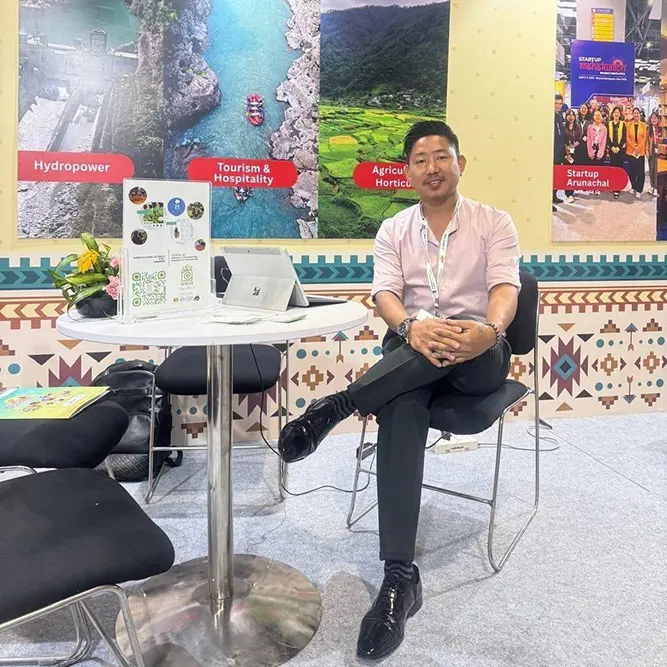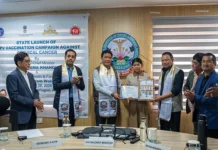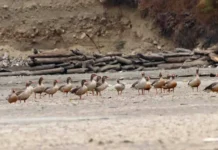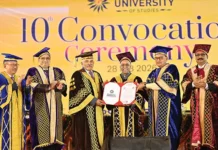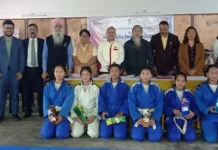[Indu Chukhu]
Everybody has a story to tell about the great pandemic, Covid-19.
It was during the lockdown days when Bini Nyickyor, who is an alumnus of St Xavier’s College, Mumbai, came up with Northeast’s first agricultural artificial intelligence app. Nyickyor used to associate with an event management company with a group of friends called the ‘Running Primates’. But things didn’t work out due to the Covid lockdowns. It was during the second lockdown that he went to his village. That was his first venture into Ninu farms.
Nyickyor is a native of Hime village in Kangku circle of Lower Siang district, and has come up with this application.
Before going to the Q&A of the interview, let’s see a glimpse of what Nyicyor said on farming after becoming a full-time farmer himself. He said, “I feelit is a different kind of relief when you connect with the soil. I took my refuge in farming only.”
Let’s now dive into the questions and answers.
Question: What can one find on the application?
Answer: Ninur AI operates on three real-time parameters. First, it has disease detection capability. With just a click of a photo from your phone, it can identify plant diseases instantly. Second, our in-house, patent-pending handheld IoT device conducts real-time soil nutrition tests. And third, a hyper-local weather API provides updates every 10 minutes, ensuring that farmers have the most current environmental data at their fingertips.
Q: Ninur Tech has a name that feels rooted in both culture and innovation. What’s the story behind it?
A: The name Ninur comes from the folklore of the Abotani clan. Ninur, the third son of Abotani, is regarded by many as a demigod, but I like to think of him as an innovator far ahead of his time. He is credited with bringing the plough to Earth, and his most famous adventures include his quest to create the hammer and the chisel. Inspired by the stomping legs of elephants, he envisioned the hammer, and through a conversation with the wind, he learned from the river reeds, thin and meek in appearance, yet sharp enough to cut the air, to design the chisel. Naming our startup after him felt natural, just as Ninur embraced invention in his era, we are working at the frontier of innovation today with AI, IoT, and ML.
Q: How did the idea come up?
A: There was no eureka moment as such. So, I believe ideas don’t fall in a linear pattern. Sometimes you find the end, sometimes the middle, or many a time in fractions. But if you want to put a finger to it,I would say during Covid lockdown. I wanted to find a solution for the farmers and the gardening community and was looking for solutions to our problems of diseases and pest management.
Q: What do you do at Ninur Tech? Any education on AI tech, etc?
A: I am currently the CEO of our startup, overseeing the finances, marketing, and administrative operations. At this pre-revenue stage, running a startup often means wearing many hats – and sometimes feeling like an octopus. As a non-technical founder leading a tech company, I bring a strong marketing background to the table, having graduated in advertising and marketing from the prestigious St Xavier’s College, Mumbai, an institution whose alumni include renowned industrialist and philanthropist, the late Ratan Tata.
Q: What can one find on the application?
A: Ninur AI operates on three real-time parameters. First, it has disease detection capability. With just a click of a photo from your phone, it can identify plant diseases instantly. Second, our in-house, patent-pending handheld IoT device conducts real-time soil nutrition tests. And third, a hyper-local weather API provides updates every 10 minutes, ensuring that farmers have the most current environmental data at their fingertips.
Q: What are the pros and cons?
A: With just a click of a picture and the press of the ‘diagnose’ button, farmers can instantly know what disease is affecting their crop, along with practical precautions and expert advice to restore the plant’s health.
Traditionally, a farmer applying for a soil test might wait up to 90 days for the report, not to mention the paperwork and hassle involved. In the Northeast’s fast-changing climate, those three months can make or break a season. Now imagine the same farmer using Ninur’s soil testing kit in just seconds. Our AI can analyse soil nutrition and provide tailored recommendations.
Finally, our hyper-local weather API updates every 10 minutes, helping farmers to be predictive rather than reactive in their farming decisions.
Honestly, I don’t see any downside for a farmer using our app; only the opportunity to farm smarter, faster, and with greater confidence.
Q: What is the difference between using the application and using the device?
A: They can still use the disease detection feature in the app and take advantage of expert advice – just not the soil nutritional value.
Q: Is it user-friendly?
A: Yes, we have worked so hard on user experience in the app and even if someone can’t read and write they can operate the app by voice. I have attached a clip on how a farmer from Dambuk using the voice operated advice on her orange tree: https://www.facebook.com/Bininyickyor/videos/1038594984331619
Q: Has it been formally launched, and how many registrations so far?
A: We launched our alpha testing on 28 December,2024, with our first cohort of orange farmers in Dambuk. Since then, we’ve conducted two more tests, one in Narwan, East Jaintia Hills, Meghalaya on 21 February, 2025, and another at Daffodil College, Guwahati, Assam, on 7 March, 2025. After hundreds of iterations and seven months of development, we officially went live on the Play Store on 31 July, 2025.
As of today, we have recorded 873 downloads since launch.
Q: Tell us about the role of IIT Guwahati as an incubation centre.
A: We’re incubated at the Technology Incubation Centre at IIT Guwahati, which focuses on deep-tech research and startups from the institute. Beyond just the IIT association, we have been fortunate to have incredible support from our professor-mentors, who guide us through every step of the research process. The programmes, the exposure, and the chance to meet professionals from venture capitalists to startup enablers across the country truly feel like a handholding experience through the startup ecosystem.
We honestly can’t thank them enough for the guidance and encouragement they’ve given us.
Q: Tell us about your team, their roles and about yourself.
A: Our core team consists of five members. Pintu Lyngdoh (co-founder) oversees operations and logistics. Proyash Baruah leads the machine learning and AI team, while Ritav Kashyap heads the IoT development and the UI/UX for both the web and app. Dr Mesanki Lyngdoh manages a team of nine resource persons dedicated to agricultural data. As for me, I handle funding, from pitching to investors and raising capital to overseeing general administration and all operations.
In addition, we’re fortunate to have three highly skilled engineering interns who contribute significantly to our coding and development efforts.
Q: How did it all come up?
A: Pintu and I are school friends and have known each other for decades now. Mesanki was referred to by him. Then Proyash and Ritav were hired and retained after a long, rigorous selection process, tested through an on-the-job ‘trial by fire’ approach.Later we sat together to hire the rest of the team.
Q: You were a full-time farmer during Covid – what inspired you to do that. What did you grow?
A: Covid was a tough time for everyone, and I was no exception. When my previous company went bankrupt, the stress really took a toll on me. Gardening became my little escape – a way to clear my head and find some peace. After the second lockdown, I moved back to my village and started looking after our family’s farmland. I even set up a small vermicompost farm, just to keep myself busy. We mostly grew rice in the paddy fields and a few vegetables for our own meals – simple, grounding work that slowly brought me back to myself.
Q: Did experiences from farming and village life inspire you to make the significant leap into technology?
A: When schools reopened and my wife’s office resumed, I stayed back in the village, visiting my family in Itanagar only on weekends. I even became a registered farmer, with a farmer ID and a trading license from the Government of Arunachal Pradesh’Agricultural Produce Marketing Committee.
While many who returned during the pandemic left soon after, I stayed and saw firsthand how hard life is for those who never left. Farming here is mostly sustenance: the same cycle every year, with little profit and no real hope of change. My friend Magi once told me over tea how they must depend on small ‘handout’ construction jobs, mostly from local leaders, just to make ends meet. It is the same for many – farming to survive, side work to scrape by.
Most still use traditional methods, reacting to the weather, instead of planning ahead. I could not shake the thought that agricultural science had solutions, yet those solutions had never reached them.
Q: What is the next big milestone for your startup and what is on the horizon for Ninur Tech?
A: A major contract is about to close, and it could be the catalyst for our first angel investment. By November, we aim to launch our pre-seed round, with active discussions already underway with a venture capital firm. Our horizon is clear and we are ambitious to become the first unicorn startup from the Northeast. We know it is a daring goal, but we believe that time, talent, and momentum are on our side.
Q: What is the ultimate vision for Ninur Tech, and what impact do you hope to create?
A: Ninur Tech’s end goal is to make farming a profession – one that farmers can truly be proud of. Through Ninur Tech, I want to bring practical tools and modern agricultural science into their hands not as fancy concepts but as everyday solutions they can use.
The aim is simple: help farmers earn better, work smarter, and build a future where they can stand tall and say “I am a farmer” with pride.

